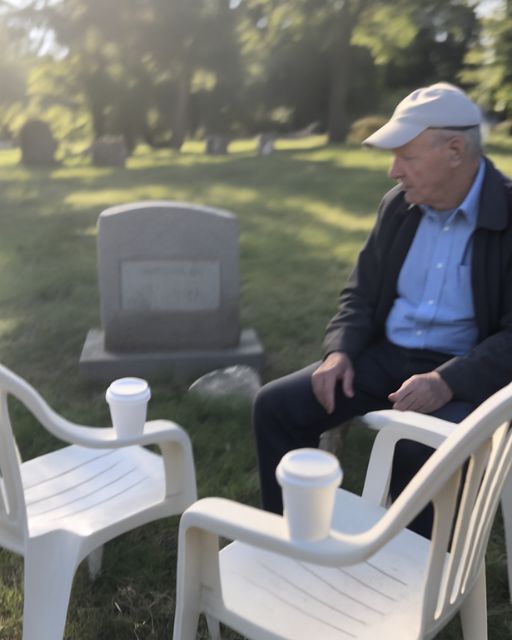“I STILL BRING HER COFFEE—EVERY THURSDAY AT 8:15”
We did this for thirty-seven years.
Same café, same booth, same half-sweet latte for her and regular black for me.
She always insisted on sitting by the window, even if the sun hit her eyes.
Said it made her feel more “in the world.”
When the doctor said the treatments weren’t working anymore, she made me promise—
“Don’t stop coming. Just because I’m not in the booth doesn’t mean I’m not there.”
So I didn’t.
Now I bring the coffee here.
Every Thursday morning, I grab two cups and head to the cemetery before the world wakes up.
I set one on the chair next to me, and I talk.
About the news, the kids, the neighbor’s ridiculous garden flamingos—she hated those things.
Sometimes people stare when they walk by.
I don’t mind. Let ’em think what they want.
This morning, though, something was different.
There was a note tucked under her headstone.
Folded. Handwritten.
And it wasn’t from me.
I froze.
It’s funny—grief makes you think you’ve seen it all. Felt it all.
But this tiny note tucked beneath her name?
It stirred something.
I reached for it slowly, like it might vanish if I moved too fast.
It was folded twice, and the paper was soft. Worn at the edges like someone had been carrying it around for a while.
No envelope. No name on the front.
Just five words in neat handwriting:
“Thank you for your Thursdays.”
I swallowed hard.
There was no one around except a man jogging with a golden retriever and a groundskeeper in the distance.
I looked back at the paper, opened it fully.
*“I’ve seen you here every week. I sit with my mother a few rows over.
I lost her last spring, and it broke something in me.I used to come just to cry. Just to survive the visit.
But then I started noticing you. Always at the same time, always with two coffees.
Always talking like she was still here.It helped me. More than you know.
So… thank you.
You reminded me that grief isn’t just pain—it’s love, refusing to quit.I hope it’s okay I wrote this.”*
No signature.
Just that.
I sat back, stunned.
I thought these Thursdays were just for me and her.
A promise kept. A routine held like a lifeline.
I never imagined someone else had been quietly holding on to it, too.
The next week, I brought three cups of coffee.
One for her.
One for me.
And one extra—just in case the note writer came back.
I placed them on the bench, waited a while.
No one came.
But I left the coffee anyway. With a sticky note:
“I read your letter. Thank you. You helped me too.”
A month passed.
Then, on the first Thursday in May, I arrived to find something new:
A small potted plant. Lavender. With a tag that read:
“For her window seat. Let the sun find her.”
It was signed with one initial: M.
I smiled.
She loved lavender. Said it smelled like calm.
I started leaving short notes each week. Tucked under the pot, or beneath her cup.
Never more than a few sentences.
Sometimes just a memory:
“She once laughed so hard in this café she snorted latte foam.”
Or
“She believed you should always compliment a stranger’s earrings.”
It became our quiet exchange.
Me. Her. And M.
Three people connected by love and loss and the smell of early-morning coffee.
And then came the twist I didn’t expect.
One Thursday, the lavender was gone.
But in its place was a folded newspaper clipping—an obituary.
It was for a woman named Marlene Vega.
Age 39.
Daughter of Teresa Vega, buried two rows behind us.
The picture in the clipping showed a woman with tired but kind eyes.
In her lap was a sketchbook.
I didn’t understand at first.
Until I saw the second note, written in familiar handwriting:
*“My cancer came back. Fast and mean.
I wanted to thank you one last time.
Your Thursdays were the only thing that made me feel steady when everything else slipped.Please don’t stop showing up.
Even if the reason feels lonelier now.The world needs love that keeps showing up.”*
I sat with that letter for a long time.
Then I did what I always do.
I placed her coffee down, tucked Marlene’s note under the cup, and whispered:
“Two women. One bench. A whole lot of grace.”
Here’s what I’ve learned:
Grief can feel small and selfish.
Like you’re the only one hurting in a world that’s too busy to notice.
But sometimes, just by showing up, you become someone else’s lifeline.
Without knowing.
Without trying.
You think you’re sitting in silence.
But your love—your simple act of remembering—is speaking volumes.
If this story moved you, share it. Like it if you believe real love shows up—again and again. And if you know someone sitting alone with two coffees… maybe they’re keeping a promise. Maybe they’re helping a stranger heal.
Keep showing up.
Love listens.
Even across the grass. Even across the years.




